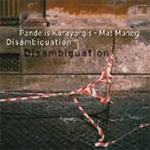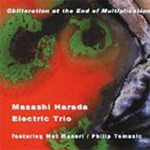| |
Microtonal Musings : Mat Maneri On Leo
by Derek Taylor
May 2002
Obvious as it may be, a binding force between these two discs reveals
itself in the slender mustachioed frame of one Mat Maneri. Microtonal
string technician, whip-smart improviser and promising composer,
Maneri's arsenal of instruments and idiosyncrasies enliven any session
of which they are a part. These two dates by wildly divergent ensembles
are no exception and the shared thread of Maneri's tightly wound
strings runs through each with efficacious energy to spare.
 Pandelis
Karayorgis and Mat Maneri have shared recording mics on numerous occasions
and as such have an intimate familiarity with each other's musical
devices. The band assembled for Disambiguation, their latest
meeting, accepts the designation of quintet from a skeptical vantage
from the onset. "Case In Point" commences at trio speed
as Maneri, Michael Formanek and Randy Peterson sally forth through
a gliding theme. Karayorgis and Tony Malaby surface for a brief string
of seconds to flesh out the dynamics before promptly dropping out,
leaving only Formanek to thrum out a naked continuation of the line.
Maneri's arco strings soon scurry away beneath him, measuring out
wispy streaks until the baton is again passed. It's a surprising relay
of ideas and one that keeps the listener guessing. Malaby's upper
register palpitations shift from gossamer to acidic, matching Maneri's
recondite squeals, and then it's Peterson's turn to stamp out a muscular
but decidedly surly solo soaked in the vibrational static. Malaby's
deeper toned horn opens "Three Plus Three" with bass and
drums in tight trio formation. He sings a throaty thematic improvisation
that again balloons under the full breath of the five players before
deflating expressively into fractional groupings. Karayorgis' contemplative
foray follows, flanked by the corpulent commentary of Formanek. Peterson's
sticks join in, followed closely by Maneri's frenetic bow, meaning
it becomes the pianist's turn to sit out. The effect is much like
a game of musical chairs with at least one player usually left standing. Pandelis
Karayorgis and Mat Maneri have shared recording mics on numerous occasions
and as such have an intimate familiarity with each other's musical
devices. The band assembled for Disambiguation, their latest
meeting, accepts the designation of quintet from a skeptical vantage
from the onset. "Case In Point" commences at trio speed
as Maneri, Michael Formanek and Randy Peterson sally forth through
a gliding theme. Karayorgis and Tony Malaby surface for a brief string
of seconds to flesh out the dynamics before promptly dropping out,
leaving only Formanek to thrum out a naked continuation of the line.
Maneri's arco strings soon scurry away beneath him, measuring out
wispy streaks until the baton is again passed. It's a surprising relay
of ideas and one that keeps the listener guessing. Malaby's upper
register palpitations shift from gossamer to acidic, matching Maneri's
recondite squeals, and then it's Peterson's turn to stamp out a muscular
but decidedly surly solo soaked in the vibrational static. Malaby's
deeper toned horn opens "Three Plus Three" with bass and
drums in tight trio formation. He sings a throaty thematic improvisation
that again balloons under the full breath of the five players before
deflating expressively into fractional groupings. Karayorgis' contemplative
foray follows, flanked by the corpulent commentary of Formanek. Peterson's
sticks join in, followed closely by Maneri's frenetic bow, meaning
it becomes the pianist's turn to sit out. The effect is much like
a game of musical chairs with at least one player usually left standing.
Maneri and Karayorgis meet on "Matutinal", the latter swaying
in lurching arcs while the former runs up the middle and around the
edges. Peterson's stammering brushes make a startling contrast for
Malaby's relatively straight-toned trip through a thematic center
that keeps changing guises. It's a strange mix of restraint and freedom,
each man holding fast to agreed upon parameters but still finding
broad range to move individually. It's a schematic that doesn't always
hold the weight of its promise, as on the meandering final sections
of "Matutinal" where Maneri chooses to saw away quietly
rather than lay out. Formanek's elastic preface on the title track
takes its sweet time building speed into a rocketing rush that signals
a rare entry by the full ensemble. Maybe it's the common presence
of smaller composites, but at full muster the band's comparative dynamics
and momentum are breathtaking to behold. Maneri fillets the tune's
head, shearing away harmonic fat that falls in ribbons onto the boiling
plate of Peterson's snare. The cool logic of Karayorgis' ensuing exploration
blankets with an icy balm while Maneri takes a breather. Malaby reignites
the flame and suddenly everyone's back in the contest charging hard
for the finish line. "Home" is heavy on Monkish flavor,
especially in Karayorgis' roving right hand. Deep exhalations can
be heard during Maneri's sojourn at the fore, further indications
of the level of concentration he's injecting into the proceedings.
 Much
like the ice paintings that are another vehicle for his artistic expression
Masashi Harada's music is a transitory venture dependent upon the
integrity of a certain set of external circumstances. Just as paint
bleeds translucent hues through the delicate crystalline boundaries
that comprise his frozen canvases, the particular peculiarities of
his two partners feed into the abstracted mass of his musical vision
on Obliteration at the End of Multiplication. Maneri's baritone
violin seems the perfect beast for this particularly fractured menagerie,
slicing and dicing through the sonic thickets planted by his partners
with a surgeon's skill and precision. Instrumentation suggests a fractured
fusion power trio, but this band draws rigorous sustenance from a
deeper, darker well. Even the quieter moments are saturated with an
irascible nails-on-blackboard edge. Much
like the ice paintings that are another vehicle for his artistic expression
Masashi Harada's music is a transitory venture dependent upon the
integrity of a certain set of external circumstances. Just as paint
bleeds translucent hues through the delicate crystalline boundaries
that comprise his frozen canvases, the particular peculiarities of
his two partners feed into the abstracted mass of his musical vision
on Obliteration at the End of Multiplication. Maneri's baritone
violin seems the perfect beast for this particularly fractured menagerie,
slicing and dicing through the sonic thickets planted by his partners
with a surgeon's skill and precision. Instrumentation suggests a fractured
fusion power trio, but this band draws rigorous sustenance from a
deeper, darker well. Even the quieter moments are saturated with an
irascible nails-on-blackboard edge.
Plectrum raking unceremoniously across dyspeptic strings, Philip Tomasic's
quick-draw guitar plugs right into the aggressive undercurrent of
the trio. His stuttering fretboard runs approximate Gatling gun rapidity
as fired notes fall like spent shell casings to the sonic floor. At
times his method errs dangerously close to the monosyllabic, but Tomasic's
talon-like scratchings always serve an indelible purpose. The excoriating
shards he sends cascading down the gunnels of "Sonic Freeze"
approximate the possible sound of a sea of oddly tuned comb tines
set into sonorous motion by an unseen force. Harada's vocals are usually
the odd man out and definitely an acquired taste. His histrionic singing
ranges from strangulated glossolalia to high-pitched banshee wails—thankfully
he directs the bulk of his manic attention to the more tempered regions
of his trap kit.
Hiccupping starts and stops are the common denominators between
tracks, as Harada's prickly pear percussion litters the landscape
with volley after volley of cold-cocking debris. Maneri dives and
dodges around the obdurate obstacles sawing up florid storms of
his own with blurred bow and gnarled fingerings. The track "Ruthless
If Necessary" seems to encapsulate both the band's credo and
the regular constituents of its collective sound. Rising from a
buzzing morass, Harada's shrill croon ebbs and flows in fitful lunges
atop the scribbling sheets of sonic expletives as his partners funnel
through their respective instruments. In sum, these three kick up
quite a racket and, despite the flawed excesses that invade on occasion,
it's an absorbing ride through and through.
|
|
|
|
|

